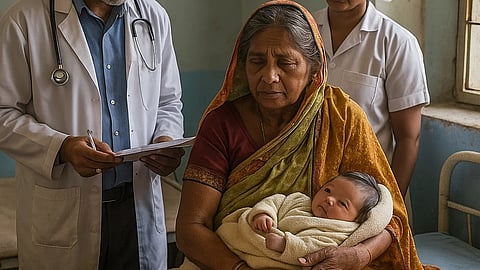Rekha, who is married to Kavara Ram Kalbelia, a scrap dealer, was admitted to a government hospital in Udaipur. Doctors noted her case as unusual because women over the age of 50 typically experience menopause and reduced fertility. On initial enquiry, the family had reported it to be Rekha's 4th pregnancy in the hospital. But later it was revealed to be her 17th. Among these, she lost 5 kids during and soon after childbirth, and currently has 11 surviving children, along with grandchildren. The father of the child admits that none of them has gone to school or had any education, as reported by the Times of India.
Rekha conceived naturally without any fertility treatment, which makes the case rare since the chances of a spontaneous pregnancy after 50 are extremely low. Doctors described the birth as “shocking” from a medical perspective, given the multiple health risks associated with her age.
Multiple pregnancies put the mother at increased risk of heavy bleeding and preterm delivery. Pregnancy at this age carries significant risks such as gestational hypertension, diabetes, preterm birth, and complications during delivery.[1] Despite these risks, both the mother and baby were reported to be stable after delivery. The newborn is a girl, and both were discharged after observation, according to reports. Rekha’s case has sparked debate among healthcare professionals about the importance of family planning, especially in communities where awareness is limited.
Dr. Mukesh Garasiya said to India Today that Rekha had been admitted on August 24 without sonography or pre-delivery tests. He also added that she could have died from excessive bleeding due to previous deliveries, the uterus weakens, and the risk of hemorrhage rises.


